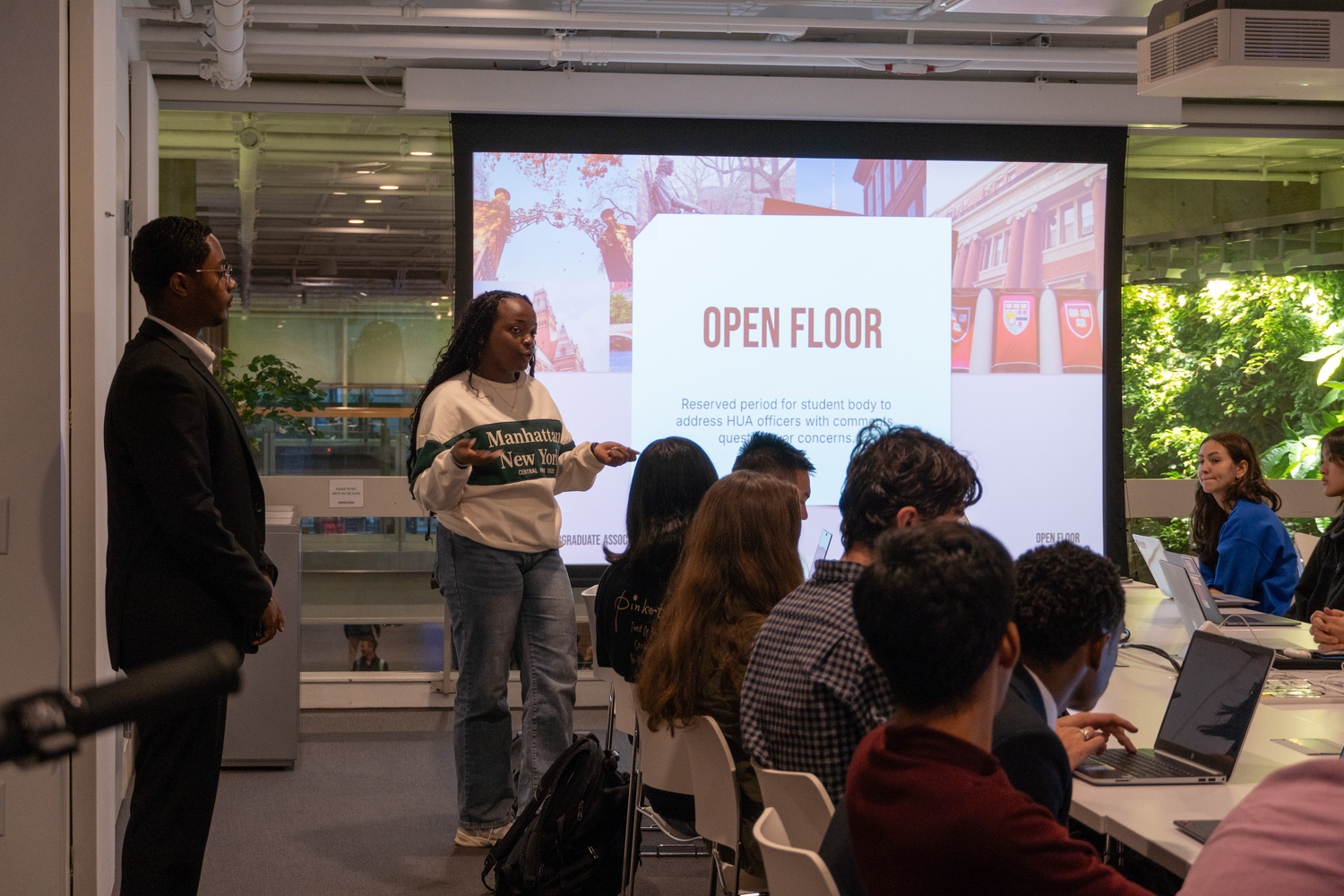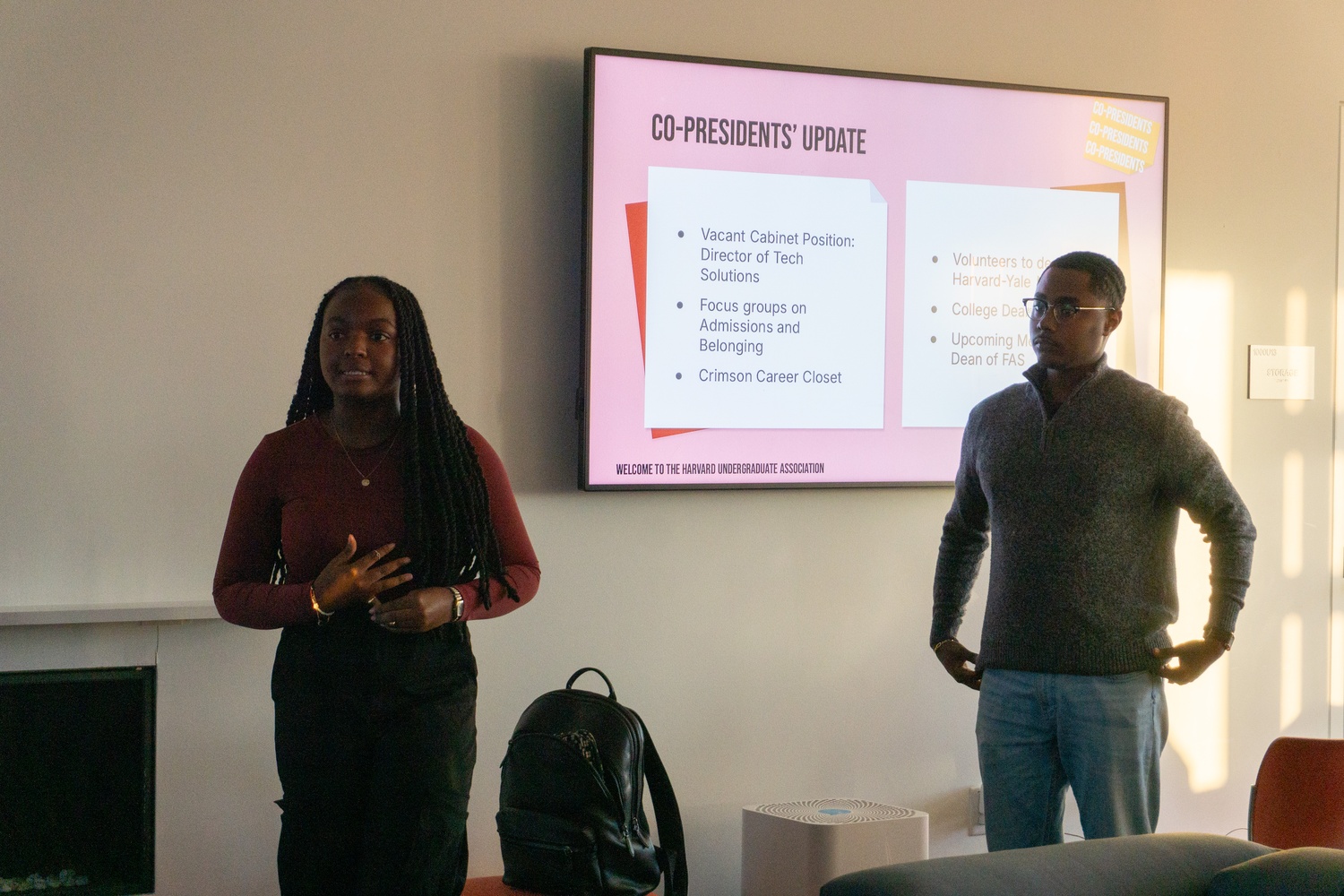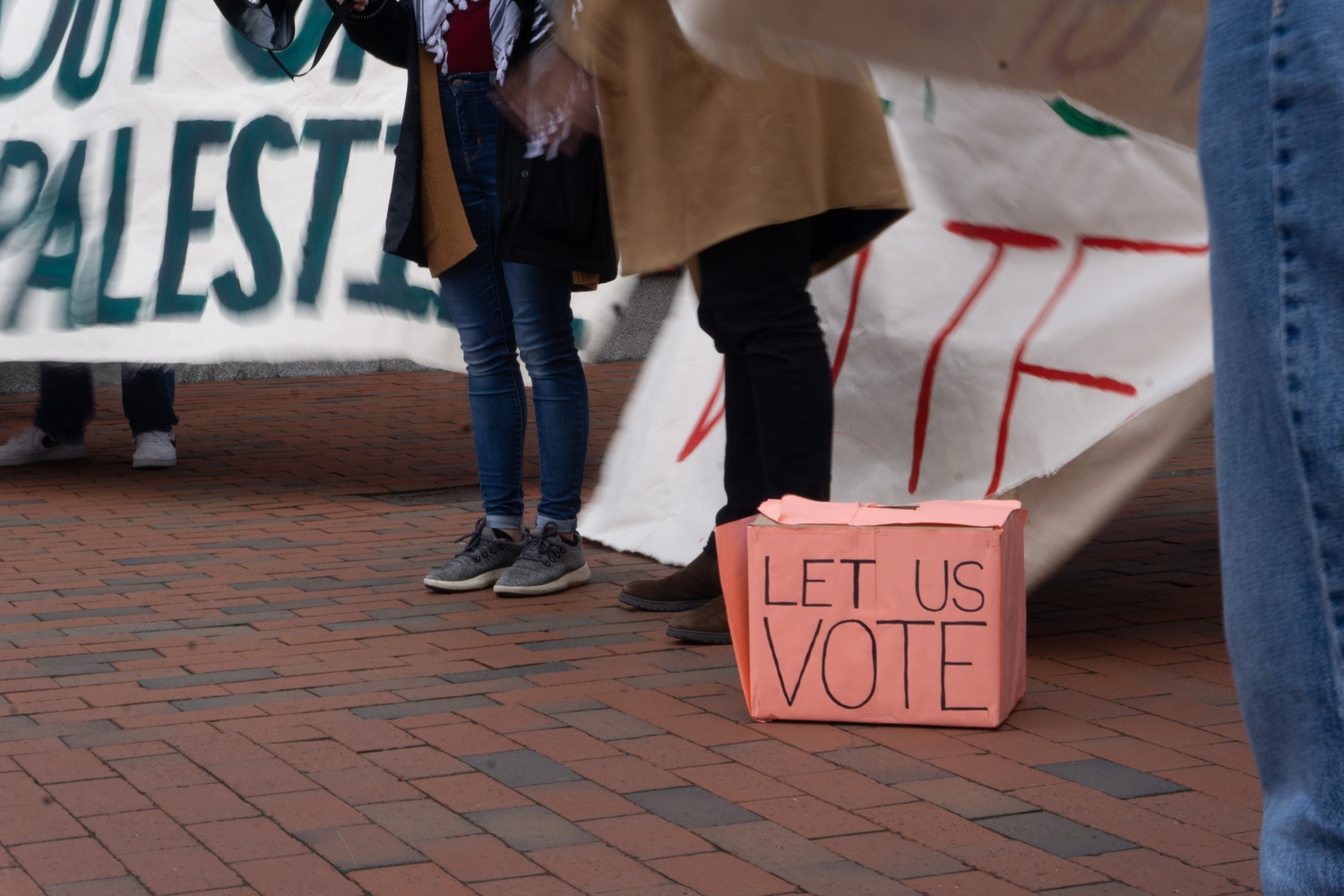A Quiet Year at the Harvard Undergraduate Association
In a year when Harvard was racked by protests and political attacks, former HUA co-presidents Ashley C. Adirika ’26 and Jonathan Haileselassie ’26 opted to keep both drama and headlines to a minimum.
As Harvard concludes yet another tumultuous year in the national spotlight, its student government, the Harvard Undergraduate Association, managed to keep itself remarkably hidden from view.
Elected to office a mere week before student protesters erected an encampment in the Yard, former co-presidents Ashley C. Adirika ’26 and Jonathan Haileselassie ’26 saw through a yearlong term beginning in April 2024 — avoiding the question of divestment from Israel that had consumed the campus and opting to keep both drama and headlines to a minimum.
While students faced historic protests, discipline threats from Harvard officials, and the beginnings of a showdown between the University and the federal government during their tenure, Adirika and Haileselassie kept a low profile, focusing instead on smaller initiatives to improve student life.
Even their campaign slogan, “A United Harvard,” emphasized a desire to avoid divisiveness and controversy.
“You can think of us as facilitators, gap fillers, really just working to improve the lives of Harvard students,” Adirika said in a February interview with The Crimson.
Their goal struck a stark contrast to past Harvard student governments, historically plagued by controversy. Its predecessor — the Undergraduate Council — met its demise after four decades, consumed by politics and accusations of financial mismanagement.
"You can think of us as facilitators, gap fillers, really just working to improve the lives of Harvard students," Ashley C. Adirika '26 said.
Though it’s only three years old, the HUA has already endured its own share of controversy, enduring fallout from the recall of former Co-President John S. Cooke ’25 — ousted from office over allegations of misconduct in spring 2024 — and an attempted referendum on divestment, which was indefinitely stalled and eventually abandoned under Adirika and Haileselassie.
“The fact that nothing has changed for the negative is probably saying something,” Aseel Rawashdeh ’26 said. “Like, I don’t know if I’m aware of anything that’s changed for the negative so far. If it is the case — that maybe there is something negative — maybe it was just a continuation of something from the previous administration.”
Adirika and Haileselassie did not respond to requests for interviews or comment for this article.
A Lot of Little Things
Adirika and Haileselassie spent the year making tweaks to existing programs and addressing many of the issues that have dominated student government campaigns for years — club finding, printing and laundry expenses, and student voice in administrative decisions.
Under a big tent platform, the pair touted their success securing textbook subsidies, setting up a laundry reimbursement program, and “building strong relationships, opening doors, and making sure students have a seat at every table where decisions are made,” according to their annual report, released in April.
“Student government should be involved in advocacy,” Haileselassie said in a February interview. “It should be involved in student welfare, allocating funds, bridging gaps between students and admin. That should be the bread and butter of student government on campus.”

The pair also promised to create an emergency grant fund for student organizations, lead Title IX awareness campaigns, and make systemic changes to the HUA constitution.
Though they did not radically change the constitution or make printing free, Haileselassie and Adirika did fulfill several policy promises, replacing monthly grants with emergency grants, creating a new fund for events hosted by student organizations, hosting a concentration declaration day for sophmores, setting up an airport shuttle for students traveling home for Winter Break, and subsidizing textbook purchases.
The HUA allocated more than $21,000 to special projects including laundry reimbursements and student outings. The rest of their budget was spent distributing the largest amount yet toward club funding.
Led by its Academic Team, the group also advocated for greater student representation on the Administrative Board, keeping the Pass-Fail General Education Requirement option for current students, mental health leave of absence reforms, and an end to time caps for non-tenure-track faculty. None of the campaigns alone led to College policy changes, but the Pass-Fail option was left in place for current students.
Students said that they were generally pleased with the programs offered by the HUA, and acknowledged their attempt to improve student life.
“I kind of like the HUA,” said Logan Ashby ’26. “I feel like the programs of theirs that I’ve utilized, like storage over breaks and some of the funding stuff, I’ve found useful.”
“I have noticed that they have, at the very minimum, been good at at least helping big student issues such as laundry, airport, transportation, which, obviously they do have limited power, but the fact that they are using that power to try to get some good things for students is nice,” Rawashdeh said.
"I think the HUA puts on a valiant effort," Jason Kleehammer '28 said.
According to the Impact report, hundreds of students used the airport shuttle program and more than 2,000 used the organization’s Finals Care packages, attended the First-Year Super Bowl Watch Party, or snacked at the enhanced First-Year Brain Breaks.
“I think the HUA puts on a valiant effort,” said Jason Kleehammer ’28.
Others said they found the HUA’s advocacy work under Adirika and Haileselassie’s administration mostly underwhelming.
“This administration, in particular, has done nothing in terms of advocacy on hard topics to administration,” said Eunice Chon ’26, a former Academic Project Team lead in Cooke’s administration.
“The student government is supposed to be a liaison, whether it’s the President of the University, the Board of Overseers, Dean of the College,” she added. “They’re also supposed to communicate with the student body and give transparent updates that they get.”
Flying Under the Radar
Despite their desire to steer clear of politics, the two spent most of their term at the middle of a controversy surrounding a referendum petition launched by the Harvard Undergraduate Palestine Solidarity Committee last April.
The petition, which passed the threshold number of student signatures to trigger a College-wide referendum, asked students whether Harvard should divest from institutions that support “Israel’s occupation of Palestine.”
The HUA also had to contend with a series of other petitions that parodied the PSC’s, which HUA advisor Assistant Dean Andy Donahue said were “on even more challenging topics and would have spurred more interesting conversation on campus.” The satirical questions included racist and antisemitic proposals.
But instead of holding a referendum, the HUA postponed all student referenda and formed a problem-solving team to “solve a dispute” surrounding the constitutional referendum policy. After six months of inaction, the group approved a proposal from Adirika and Haileselassie to limit referenda to matters of HUA policy within the constitution.
The question on divestment went unanswered by the undergraduate body.

Clyve Lawrence ’25-’28 called the delay an attempt to hijack the vote “by allegedly sending in a racist referendum proposal to cancel out the pro-Palestinian proposal.”
“When it comes to these political issues, there is a role for student government to play,” he added. “We’ve seen this on other campuses where student government and the student body have voted to divest from Israeli apartheid. Harvard should be able to do the same.”
The student bodies at Harvard Law School and the Harvard School of Public Health both passed referenda calling for the University to divest from Israel since the PSC’s question was first proposed.

But the former HUA co-presidents argued that the constitution already restricts political speech.
“Our referendum process, as outlined by our constitution, has never been about political opinions,” Haileselassie said in the February interview. “We were presented with the new policy, which was to take the Constitution at its word, and keep the referendum process for HUA policy and student polling.”
Adirika added that the HUA could advocate for spaces to express political opinions, but insisted “we don’t adopt political opinions of our own.”
Despite the referendum briefly making national headlines, most students said it was barely a blip in the year’s chaos.
“I really know nothing about the HUA. I don’t really know what they do. I actually don’t even really know what that stands for,” Ryan F. Irving ’27 said. “Harvard University Association?”
As they transition the young student government to its fourth pair of co-presidents, Adirika said the two did their best.
“While we can try to be our best in influencing the decisions that administrators make, the ultimate decision is not in our hands,” Adirika said in February. “Ultimately, we don’t have infinite power and infinite resources.”
—Staff writer Nina A. Ejindu can be reached at nina.ejindu@thecrimson.com. Follow her on X @nina_ejindu.
—Staff writer Claire L. Simon can be reached at claire.simon@thecrimson.com. Follow her on X @ClaireSimon.
